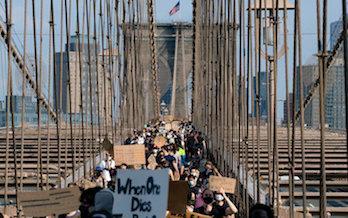
More than 50 journalists attended “Re-Framing Journalism with a Solidarity Approach: An Interactive Workshop on Covering Coronavirus” throughout the week of June 1. Anita Varma, PhD, assistant director of Journalism & Media Ethics as well as Social Sector Ethics at the Markkula Center, led the workshops in collaboration with Aubrey Nagle and André Natta of Resolve Philly, with support from Democracy Fund.
“I’m here to learn, and specifically would like to learn how I can do better when covering marginalized communities,” said one journalist in attendance.
Divided across five Zoom sessions, groups ranged in size from six to sixteen participants. Participants included reporters, editors, student journalists, and journalism educators who joined from national, metro, and local publications as well as journalism organizations. Workshops were open to furloughed reporters as well.
In each session, Varma, Nagle, and Natta began by asking participants to introduce themselves, and then opened a discussion designed to help journalists reflect on their motives and aims when covering marginalized communities. The remainder of the 75-minute workshops focused on sharing a synthesis of Varma’s ongoing research on solidarity in journalism, community engagement practices Natta encourages in his capacity as project editor of the Broke in Philly collaboration, and resources such as the Reframe guide that Nagle developed.
Although the workshops were originally planned as focused on the disproportionate impact of coronavirus on marginalized communities in the United States, workshop organizers recognized the need to expand the scope to address the ongoing protests and collective action against police brutality in the wake of the murders of George Floyd, Breonna Taylor, and many others.
“As the week went on, I noticed more and more folks registering to attend the workshop,” Varma noted. “It is bittersweet to reflect on how terrible injustices across the country likely played a role in this workshop garnering more attention across journalism networks.”
"I was really pleased to see such fruitful discussions take place among journalists from all over the country and many types of outlets,” Nagle added. “Though I wish the world events at the heart of these conversations were different, it's always great to see journalists being proactive in improving their work."
“My hope is that a solidarity approach to covering marginalized communities, paired with the great model of Broke in Philly and guidance from Reframe, will help journalists enrich their craft,” Varma said. “We are eager to continue these conversations.”
If you are a reporter or member of a news organization and would like to participate in a digital workshop on implementing solidarity approaches to reporting, please contact avarma2@scu.edu.